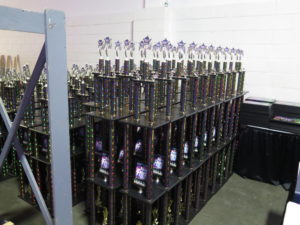My Day at NJ DEP: Meet David Glass, Deputy Commissioner NJ Department Environmental Protection. BTW-NJ DEP Does Amazing Work; Who Knew? by Calvin Schwartz August 21, 2017
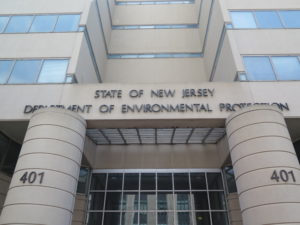
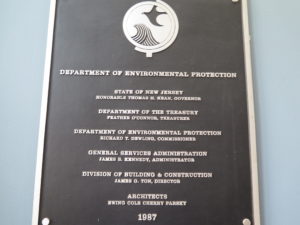

post interview with Deputy Commissioner David Glass

a view from OUR Rutgers Football seats
Do you ever wonder how interviews evolve; behind the scenes stuff; mechanics of commonality that bring journalist and administrator to a conference table? Actually, our (David Glass and me) time today was spent around a conference table on the seventh floor at DEP in Trenton. I believe one of mankind’s greatest inventions is the conference table.
Cut to fifteen years ago or so, at Rutgers Stadium, my son and I sat right next to David Glass and his extended family in section 103 for Rutgers football. We all became even a larger family sitting together for most of those fifteen special years. We watch football, talk football, cheer, lament, talk some basketball, alumni events and recent familial highlights like marriages and births and look forward to seeing each other for the Spring football game. No time for any other topical conversation or current events. It’s all Rutgers football.
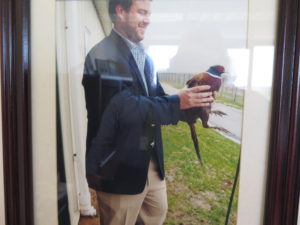
David Glass “hands-on”
Three weeks ago, David congratulated me on Linked-In for my six-year anniversary at NJ Discover where I practice journalism and broadcasting. I thanked him and noticed what he does in real life. He is the Deputy Commissioner of NJ DEP. Imagine my overwhelming surprise as I’ve been somewhat of a conscious environmentalist since I participated in the very first Earth Day on April 22nd 1970. This interview was born out of that discovery. We were both excited.
To be a good journalist, I spent a week studying NJ DEP, watching documentaries on planet Earth, and digesting as much as I could on air, water and the land we love here in New Jersey. I was accompanied in the elevator to the seventh floor of NJ DEP Building on East State Street, to David’s office and conference table with splendid view of Trenton straight ahead.
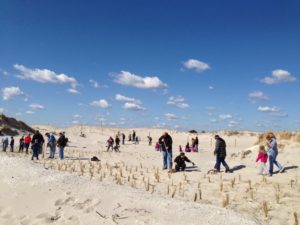
State sponsored beach grass project
David graduated from Rutgers University then worked for Congressman Leonard Lance, in the 7th Congressional District. He started at DEP as a deputy chief of staff. He grew up in rural Warren County, where trout were stocked in rivers and his parents had wooded property with a stream. It’s where his love and respect of land was nurtured.
I had four pages of questions in no particular order except streams of consciousness. I was curious about New Jersey’s policy akin to California and New York Governor’s statements about adhering to Paris environmental guidelines since President Trump pulled the United States out of those accords. David responded, “Governor Christie recently affirmed no new coal plants in New Jersey…. with SO2 (sulfur dioxide) emissions we were fifth lowest….NO2 (nitrogen dioxide) third lowest (in USA) …. And CO2 (carbon dioxide) ninth lowest.” Frankly, I was amazed with the rankings, stereotypically thinking the worst about New Jersey air. David smiled at my enlightenment.
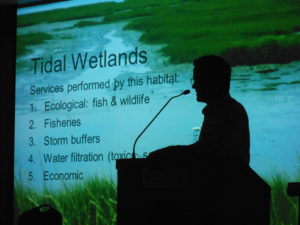
at a lecture I attended on rising Sea Levels in New Jersey
Back in 2011, New Jersey filed a petition regarding SO2 emissions from the Portland Power Generating Station in Pennsylvania. David explained they were polluting our air here in New Jersey. “So, we filed a petition with EPA and were successful and the EPA mandated they clean up. They paid for environmental damage and the air and water are cleaner.” It kind of reminded me of Erin Brockovich, making that Pacific power company pay for pollution.
David went further, “We pulled out of the Regional Greenhouse Initiative because we were the third lowest in the region with carbon emission.” Governor Christie signed Executive Order 60 where NJ works with private sector to try and reduce carbon emissions with construction equipment. Grant money is given to retro fit equipment to make it more environmentally friendly.

125th Anniversary of NJ Fish and Wildlife
If you watch enough documentaries of doom, gloom and instinctive reality, the fact slaps you in the face, sea levels are rising alarmingly fast. I’ve joked on my NJ Discover LIVE TV Show that living inland 22 miles, one day soon, I’ll have beach front property and my house will be worth a fortune for two weeks until its under water. David laughed. I asked him about this new aspect of DEP, adaptation; Accepting the imminent changes to our world and adjusting to it.
“Humans want to live near water so now we have to better plan. There is a Blue Acres Buy Out Program for willing sellers where their property continually floods. They sell their home to the state for fair market value…. the state demolishes the property and makes parks or buffers….so far 600 homes have been purchased in Sayreville, Woodbridge and around Passaic River.” There is a budget of $300 million to get out of harm’s way. I never knew this.
There is also an elevation program for primary homes. New homes in prone areas must be elevated according to Federal guidelines. New Jersey added a foot more. The Army Corps of Engineers have $1.3 billion for shore replenishment. It takes the form of dunes and bulkheads. The Science and Coastal section of NJ DEP found wetland buffers fair better in protecting. I mentioned seeing in a documentary how even beach grass (roots) protect. “Material from dredging is even added at the surface of wetlands…. HUD and NJ got two grants for Weehawken, Jersey City and Hoboken…. $230 million for a flood control project is in the design stage…. $150 million is designated for flood protection at the Meadowlands.”

with Environmental Justice Advocate Dr Nicky Sheats at Peoples Climate March Sept 2014
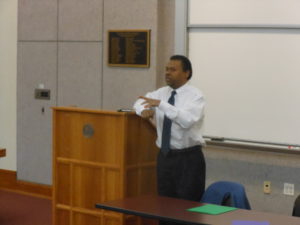
Dr Nicky Sheats lecturing at NJ Environmental Conference in Newark
The next question/topic for David, as I explained, was very close to my heart and soul. For years, I’ve been going to NJ Environmental Federation and Clear Water Conferences and when opportunity, I’d go to workshops with Dr. Nicky Sheats who speaks about Environmental Justice. What is that? For example, Newark, my birthplace, has a landfill (which means pollution) and a few years ago, they built an incinerator there. We know why. Then, they wanted to build a coal firing plant in Linden, already burdened with the highest rates of asthma because of the refineries next door in Elizabeth. I was at that conference which discussed that plant. I asked why Linden? Their response was that a coal firing plant needed railroad access/tracks to move coal and an ocean to dump waste. Linden had that. I reminded everybody that Rumson had the same tracks, ocean and probably more vacant land. There was silence. Yes, environmental justice.
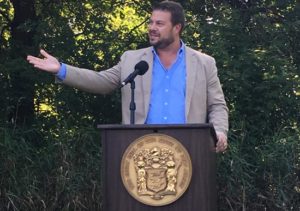
David Glass addressing audience for Millstone Dam Removal Project Completion
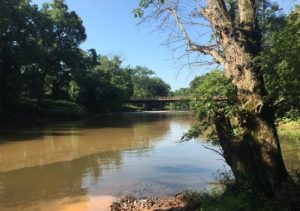
the finished Millstone River project
David added, “We make sure now that we are plugged into permit decisions…. Has applicant engaged with local community…. We have 75 programs, 2800 employees and 800,000 acres of land to watch over.” NJ DEP is very concerned how to get better contact with urban areas. This led to the Camden Kroc Center initiative, rehabilitating former landfills to park lands. “At the Camden waterfront, there was an abandoned gas station which was developed into a rain garden…. It’s about getting boots on the ground.” I love this expression.
There is the Camden Collaborative Initiative which is also now in Trenton and Perth Amboy. “It’s about making sure everyone is talking to each other.” There is an Environmental Justice Advisory Council (EJAC). I didn’t mention this to David, so I’m doing it now. I was sitting there taking notes, asking questions, some rather difficult, but all the while, marveling at the depth, sincerity and knowledge of this environmental administrator. I call it as I see it.

In my studying up these last few days, I learned of the Millstone Dam Removal Project and saw a picture of David proudly speaking on the success of this project. “It was a combination of Federal, local, Millstone, US Fish and Wildlife looking at our past dams, some originally constructed over 100 years ago…. Because this project (Millstone River) opened up this old dam, American shad, river eel started swimming here again. “
I never knew this but NJ DEP has a radiation protection program where they do spot inspections of dentists etc. x-ray machines to make sure they are calibrated correctly protecting patients and techs. “And yes, they can take enforcement action.” It actually can even reduce misdiagnosis caused by faulty equipment.
Perhaps I surprised David when I asked about the Artificial Reef Program. I did see a picture online of a ship from the ‘Perfect Storm’ being sunk recently off Cape May. There are two active reefs in New Jersey waters and thirteen in Federal waters. Much of program is funded by private sector. It determines what is best suited for fish congregating, concrete or sunken (metal) ships. “Rutgers University did a reef trap study to find what type of material attracts certain species…. They pulled the traps which were loaded with lobster three miles off the coast…. This ties into the party boat fishing industry which employs 65,000 people; recreation and commercial.” I exclaimed, “Lobsters in Jersey!” I never knew this.

The truck carrying a sofa to be illegally dumped at Allamuchy State Park CAUGHT on camera.
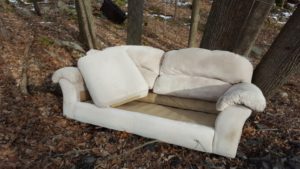
the illegally dumped sofa caught on state camera.
I told David about my attending a rally in Asbury Park back in February to prevent ocean drilling off our coast. The rally hosted by Senators Booker and Menendez. “Governor Christie is opposed to the industrialization of the coast line. There are too many downsides.”
NJ has a Wildlife Action Plan for endangered species. I started this topic off with the depressing notion of biological annihilation like the African elephant being gone in 20 years and the fact that our human species have wiped out 50% of Earth’s wildlife in the last 40 years. The math is scary. If citizens here in NJ see problems with wildlife, NJ DEP needs it reported. “We released a bobcat into the wild. To see it run into the wild forest was breathtaking…. There is an active forestry management. Nature needs help…. There is tree thinning, clearing…. We work on this all the time but not publicized.”
The best way to finish a heavy duty serious interview is to take a lighter (if environment can ever be light) approach. I’m still smiling about this. “There is a Don’t Waste Our Open Space Program. It watches people who illegally dump with hidden cameras…. Public also reports violations and there is a detective bureau. Seventy violators have been cited, some contractors.” I positively loved his story of a man who illegally dumped a sofa in Allamuchy State Park only to have detectives ring his bell the next morning.

Deputy Commissioner NJ DEP David Glass; “an exceptional administrator”
I looked at my watch trying to be polite and not go way over our budgeted time. Ninety-three minutes had elapsed and we were way over. I got to ask about 1/3 of my questions leaving that open-door space for another interview perhaps on our NJ Discover TV Show. My head was swimming with so much input from this exceptional administrator. I thought about it being a brave new world. Since we’re both loyal sons of Rutgers, we hugged saying goodbye, with the joint stark realization that in the past 93 minutes, not a word about Rutgers football, kickoff in a few weeks. And so it goes.
Everything to know about NJ DEP: http://www.state.nj.us/dep/
Also check out their podcasts: http://www.state.nj.us/dep/podcast/
http://www.nj.gov/dep/parksandforests/


 Follow
Follow




